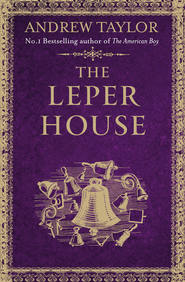По всем вопросам обращайтесь на: info@litportal.ru
(©) 2003-2024.
✖
The Ashes of London
Автор
Год написания книги
2019
Настройки чтения
Размер шрифта
Высота строк
Поля
‘But they are not meaningless, madam. They are plans – they are designs of buildings that—’
‘Fiddle-Fiddle.’ Aunt Olivia’s temper was rising. ‘It is not an occupation for a lady. Besides, your uncle has been very kind to you in making this arrangement. He wants to see you comfortably settled, as you are his poor sister-in-law’s only child, and you may be in a position to help him and your cousin once you are married. You should remember that it cannot have been easy for him to manage – after all, Sir Denzil knows who your father is. Everyone does.’
CHAPTER SIX (#ulink_46c7d974-053c-5ab6-9516-e08b657aff19)
WHEN CAT WAS very little, the Lovetts had a dog. He was a nameless animal of no breeding but infinite patience. The dog reminded her of Jem in more ways than one. One of her earliest memories was of toddling in the garden of their house in Bow Lane, hand in hand with Jem, with the dog on the other side of her.
It was difficult to say exactly what Jem did at Barnabas Place. In the old days, he had worked for her father as a confidential clerk and manservant. When their troubles came, her father had sent him with her to her aunt in Champney. Later Jem had escorted her to Uncle Alderley’s.
Jem had been old even then, but his breathing had been better and his joints not so rusty. He was not valued at Barnabas Place. He slept in the loft above the stables, along with the man who killed rats, emptied slops and did other unpleasant necessities. He ate in the back kitchen and did what he was told to do. Apart from board and lodging he did not receive a wage, though Cat occasionally gave him a few pence or even a shilling or two.
‘It isn’t fair,’ Cat once said to him. ‘You’re always working, always doing something for someone. They should pay you.’
‘The master gives nothing for nothing.’
‘But you give him something.’
‘You don’t understand, mistress. I am nothing. To your uncle, I mean. His worship wouldn’t miss me if I were not here, so why should he pay me? If he thinks about it at all, he knows I will stay whether I’m paid or not, because he knows I have nowhere to go. He pays nothing for nothing. That’s how he’s become rich.’
Early in the evening of the day of the dinner, after Sir Denzil Croughton had been assisted to his coach, Cat went in search of Jem. She found him in the little yard behind the washhouse. He wasn’t wearing the Alderley livery any more. He was in his ordinary clothes and preparing lye, the mixture of ashes and urine that was used for soaking badly soiled laundry. It was a woman’s job usually but the washerwoman had lost the two girls who usually came in to assist her; presumably they and their families were somewhere among the flood of refugees.
The walls of the yard were high, trapping the hot air below the heavy grey sky. The grey was tinged with an orange glow. Even here, the ground was flecked with ashes. Cat watched him at work for a moment before he saw her. He was stirring the mixture in a half-barrel, stooping over his work with the sweat streaking his shirt and running down his arms. His thin grey hair hung limply to his shoulders.
When she called his name, he turned his head. His face was red with heat and exertion, shining with sweat. He stared unsmilingly at her.
Cat wrinkled her nose. ‘Come in here. I can’t talk to you there.’
She turned and went into the barn. She heard his dragging footsteps behind her. She stopped and faced him.
‘How can you bear it?’ She spoke at random, for her head was hurting and she found it hard to gather her thoughts. ‘The smell. The heat.’
He shrugged, and she realized that for him it was not a question worth answering. ‘Is there news of Layne?’ he said.
‘Not that I’ve heard. Why?’
‘Sometimes I wonder about him, mistress.’ He stared at her. ‘He likes to know where you are.’
‘Layne does? Why in God’s name?’
‘I don’t know. But I’ve heard him asking your aunt’s maid, more than once, and I’ve seen him watching you. I think he searched my box the other day, though I can’t be sure. If he did, he might have found—’
‘I can’t worry about Layne now,’ Cat interrupted. ‘I want to go out tonight. I’ll need clothes again.’
Jem shook his head.
‘An old shirt – a pair of breeches. That’s all.’
‘No, mistress.’
‘But there must be something you can find. There’s a chest of rags for the poor, isn’t there? You’ll find something in there, I’m sure. I have a cloak now – the one I found yesterday.’
‘It’s too dangerous.’
‘That’s not for you to decide. Do you need money? Would that make it easier?’
‘I won’t help you.’
‘Why not?’
He looked at her. Their eyes were on a level. ‘Because it’s not safe.’
‘What does it matter?’ she said. ‘I must see my father. They are going to make me marry Sir Denzil. I’d rather die.’
Jem ignored that. ‘I shouldn’t have let you go last night,’ he said. ‘The City is a madhouse on fire.’
She stamped her foot. ‘You’ll find me clothes. And you’ll wait at the door and let me in when I come back.’
‘No.’
‘I command you.’
‘I’m sorry, mistress.’
Cat advanced on him. ‘I can’t do this without you.’
He stood his ground. ‘You won’t know where to begin. He can’t meet you in St Paul’s now.’
‘I’ll find him. In Bow Lane, perhaps.’
‘But there’s nothing left in Bow Lane.’
For a moment she grappled with this idea, that the house where she had grown up no longer existed. ‘Nearby, then.’
‘He could be anywhere, mistress. If he’s still alive.’
‘Of course he’s alive.’ She glared at him. ‘Can you send word to him?’
‘No. He always sends word to me. Safer that way.’
‘How?’
Jem shuffled, easing the weight on his lame leg. ‘I was told not to tell you.’
She scowled at him. ‘My father hasn’t seen me for six years. He forgets I’m not a child any more. So do you, but with less reason.’
He stared at her for a long moment. ‘There’s a man,’ he said at last. ‘He brings me a letter sometimes, or sometimes just a message. And he takes them from me in return. Yesterday he told me that you should go to St Paul’s, that your father would find you there in Paul’s Walk.’
‘Who is this man? Where can you find him?’











